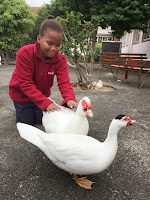 |
| Shannon with Cornflake |
 |
| Angela with Sassie and Tyler |
One of the first times we realised how important animals were, was when a new boy was throwing a tantrum in the classroom. His teacher noticed the class budgie in the cage close by, was sitting with his head cocked to one side and quietly watching. She told the boy that 'Buddy' was watching the tantrum and suddenly the screaming and antisocial behaviour stopped! This change in behaviour started a very positive process in behaviour change for this child.
 |
| Chane with Robert |
 |
| Khayan with Lemon |
We have also had success in integrating children and animals when children have never interacted with animals before. Suddenly an animal is close but not threatening, and children learn that they can walk past a puppy without being bitten. Children who haven't ever had animals at home learn how to care for an animal in a nonthreatening way.
 |
| Kayden with one of our fishtanks |
 |
| Raaniyah with Liefie |
No comments:
Post a Comment